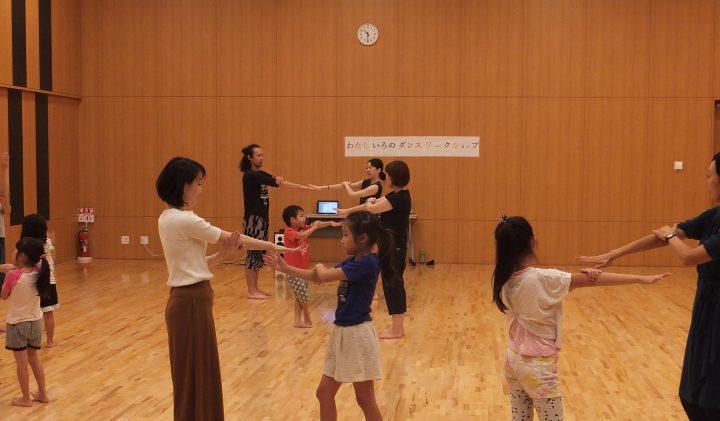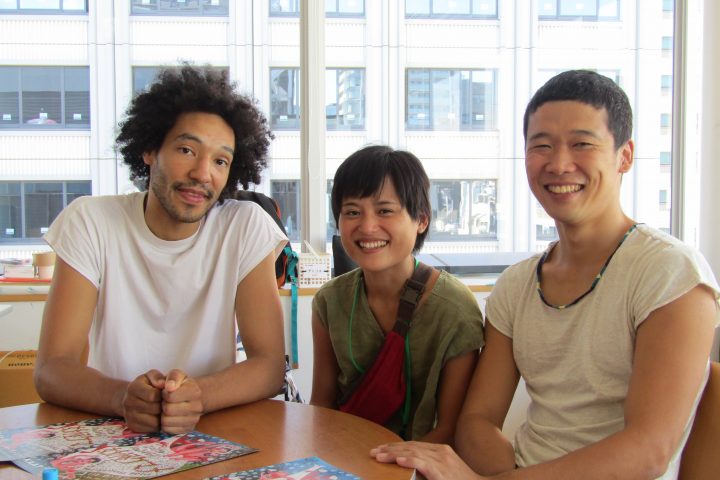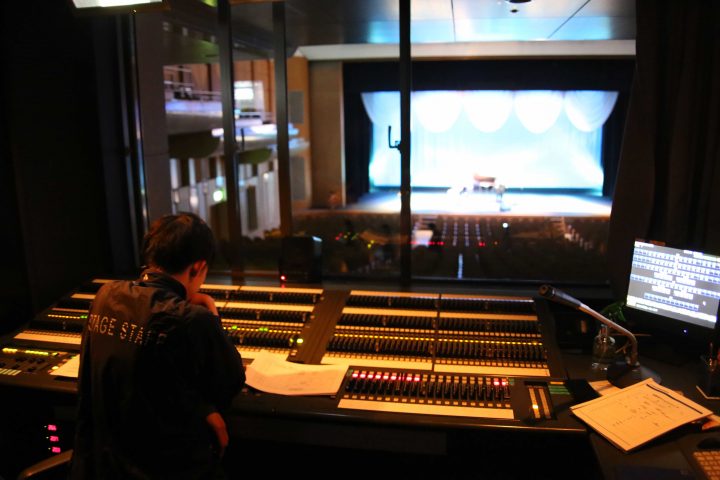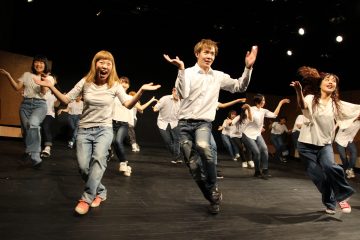Kanagawa Standing Drinking Culture Talk Vol.7 "Life and Adventure"
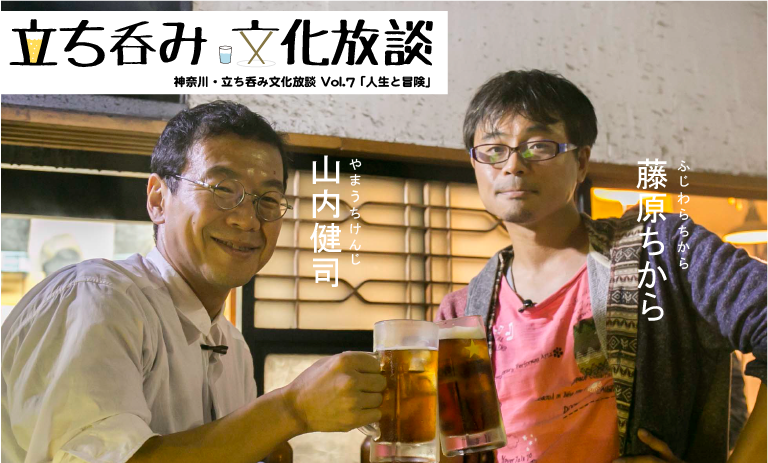
Text: Akiko Inoue Photo: Masamasa Nishino Published on 2015.11.11
Chikara FUJIWARA
Editor, critic, and founder of BricolaQ. Born in Kochi City in 1977. Moved to Tokyo at the age of 12 and started living alone there. Moved around a lot after that, worked for a publishing company before going freelance. Edited Musashino Art University's newsletter "mauleaf" and Setagaya Public Theater's "CaroMag". Co-edited with Tsujimoto Chikara "Book Guide to Architecture" (Meigetsudo Bookstore). Co-authored with Tokunaga Kyoko "The Strongest Engeki Theory" (Asuka Shinsha). Currently lives in Yokohama. Member of Theatre Center F. Also creates "Engeki Quests" in various locations, where participants stroll around cities and peninsulas with gamebooks in hand.
Kenji YAMAUCHI
Actor. He joined the Seinendan Theatre Company while studying at International Christian University, and was heavily involved in the creation of "contemporary colloquial theater" that began in the 1990s. His representative work, Tokyo Notes, has been performed in 24 cities in 15 countries. He has participated in many international co-productions with France and Korea. He is involved in a wide range of activities that go beyond theater to include workshops and other activities. In 2010, he was a cultural ambassador for the Agency for Cultural Affairs, and performed a one-man play entirely in French at elementary schools across Europe.
Before filming, we went for a walk around the town of Noge! Check out the video here.
"Night Walk in Noge" (Starring: Chikara Fujiwara, Kenji Yamauchi, Supported by Hoppy Sennin)

Fujiwara Chikara (hereinafter Fujiwara): I leave all the ordering for this restaurant to Mr. Yamauchi!
Yamauchi Kenji (hereinafter Yamauchi): Eh!
...Then, I'll order a Kinmyou bottle and mix it up as I like.
So, that brings us to the conclusion...
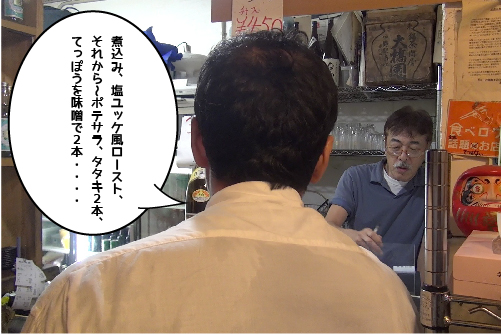
Yamauchi, who says he visits this restaurant frequently, ordered his usual menu items from the extensive menu.
Fujiwara: That's a great request (laughs).
Yamauchi: Well, I ordered the same things I always order (laughs).
Once we got to the table, let's have a toast!
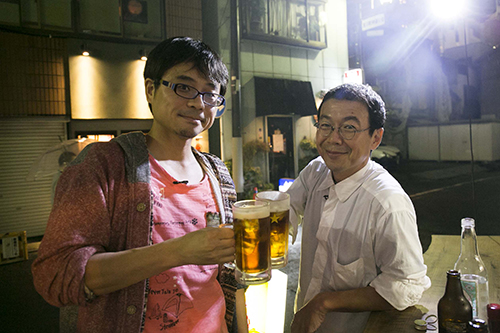
Both of them started off with black Hoppy.
Unfortunately, it was raining on the day of the interview. We avoided the usual crowded interior of the restaurant and rented a table outside for the recording, but...
Yamauchi: Outdoors.
Fujiwara: I think it's a fitting situation for today's theme, "Life and Adventure"... (laughs)
The reason why I chose the theme of "adventure" is because Yamauchi-san is a mountain climber, but I also think he has been on artistic "adventures" such as performing in plays overseas and working with young directors to create works. Also, including small everyday adventures like opening the door of an unfamiliar drinking establishment (laughs), my impression of Yamauchi-san is that he is "an adventurous person."
Yamauchi: That's not true, it's normal (laughs)
Fujiwara: Anyway, let's have an adventure today and see how much we can drink... (laughs) No, I don't think that's normal.
Meeting Oriza Hirata - When I opened the door to the club room, Oriza Hirata was there
Fujiwara: You've been a member of Seinendan since Oriza Hirata first established it. How did you first meet Oriza?
Yamauchi: I've been mountain climbing since I was in elementary school, influenced by my parents, and I was determined to join the mountaineering club when I got to university, but there was no mountaineering club. So I joined the only one that was there, the Wandervogel club. The day after the entrance ceremony, I opened the door to the club room and found Oriza Hirata there.
Fujiwara: In the Wandervogel club?
Yamauchi: Yes. It was right after he had traveled around the world and published a book with the long title "Oriza at Sixteen" ("A book that tells the story of the successful bicycle trip around the world, revealing the final point reached by the 16-year-old Oriza's unparalleled courage and the limits he could reach").
Fujiwara: I can't really imagine what it would be like to have Hirata Oriza as a senior in your club... What was it actually like?
Yamauchi: Well, he is a strange guy (laughs).
The story of that time is written in detail in Oriza's book "Map wo Tsukuru Tabi - Seinendan to Watashi no Rireisho" (A Journey to Create a Map - Seinendan to Watashi no Resume), but in my student days we would often gather with a beer at a place called Penguin Village in Mitaka, which is like what we would call a shared house today, and I remember another senior student there telling me, "Hey, this guy has traveled around the world." When I said, "What are you talking about?" he said, "Really, really, I have the book over there," so I took a look and there was that book with the red spine on a black bookshelf, and I thought, "What is this!" And that was the beginning.
Fujiwara: Wow!! So what made you decide to continue working with this person after graduating from university?
Yamauchi: Of course I had respect for Oriza, but rather than wanting to work with him, I think I was more concerned with not letting what I'd spent the past four years doing just become a memory when I graduated from university, and with the idea that I could make the theater we were doing the centerpiece of my life.
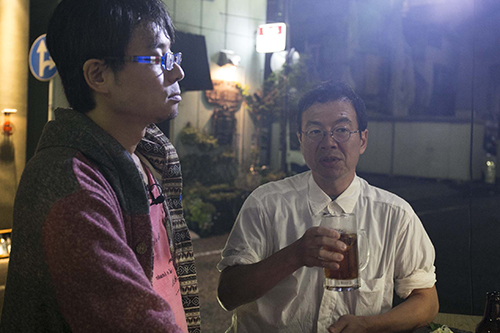
Fujiwara: Seinendan's theater has been called "modern colloquial theater" or "quiet theater," but Yamauchi and your colleagues have been working with us since before that style was established.
Yamauchi: At that time, Yume no Yuminsha and the Third Theatre Company were at their peak, but I think we started doing modern colloquial theater about one or two years after graduating from university. We first started thinking about how we could do it separately from Hideki Noda and Shoji Kokami. There are many things to talk about during this period, but at the time, I was more excited than anxious.
Fujiwara: I'm excited to hear about the mindset of the Seinendan in its early days... I think the Seinendan has a long history.
Yamauchi: Oriza was clear-minded from the time he was 19 (laughs).
Fujiwara: Has it always been that clear?
Yamauchi: It was so clear it was absurd (laughs).
I often got angry and said things like, "The world is much more complicated than that! Why do you say things in such clear terms?"
Fujiwara: Hahaha. But Yamauchi-san's fight is at a slight disadvantage compared to that clarity (laughs).
Yamauchi: I think he's probably similar to Chikara-san. I'm a bit more of a rich kid, so I don't understand the mission of having to win an argument (laughs).
Fujiwara: Well, I just had a poor upbringing.
Yamauchi: I'm sure he would say something similar (laughs).
Fujiwara: I see... (laughs)
Yamauchi: But it's true that there may not be many theater companies in Tokyo like Seinendan that have been around since student days.
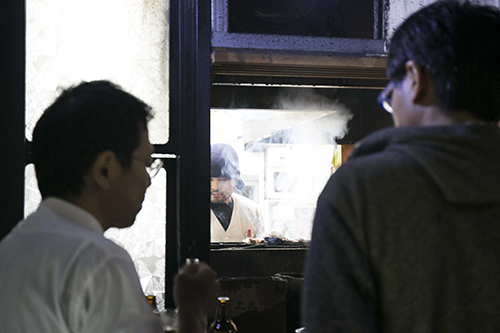
This is where the grilled liver comes in.
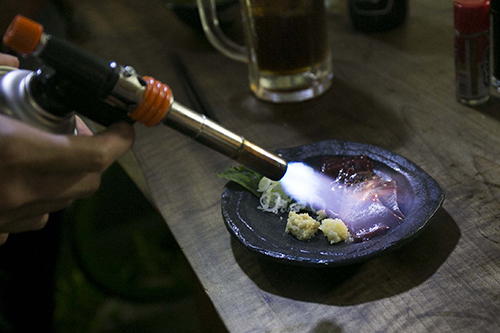
Please grill it over the burner provided in the store before eating.
Collaboration with young people - has a "young person" finally appeared?!
Fujiwara: I think the first time I spoke with Yamauchi was in 2009 when he performed in "Coma" directed by Kamisato Yudai. When I saw the performance, I thought, "Who is this guy?" At the time, I had been in contact with young theater people, but I had not yet started working as a critic in earnest, and I had never seriously thought about what theater people of Yamauchi's generation were thinking and what kind of physical expressions they were showing on stage, so I was just like, "Wow!"
Yamauchi: Wow (laughs)
Fujiwara: After that, Yamauchi-san continued to work with various young people, such as Takahiro Fujita of Mum and Gypsy and Yukio Shiba of Mamagoto, but I don't think that could have been achieved by taking a defensive stance. When I watch Yamauchi-san creating plays with young people, I get the sense that he is serious, but at the same time, he is using the opportunity to "play" in a very good way.
Yamauchi: But, as you get older, a lot of specs decline...
For example, when I see actress Izumi Aoyagi remembering her lines after reciting them twice, it's a shame that my specs drop, but I'm always thinking about how I can have fun with people like that.
Fujiwara: Mr. Yamauchi, why are you interested in young theater people?
Yamauchi: I wonder why...
One reason is that I think their fearlessness is what makes them so appealing, despite their generation.
I myself have felt a lot of pressure from the older generation. Like, you can't be accepted as a member of society unless you get a job. Because, in our generation, having a child was synonymous with quitting acting. But my juniors, about 10 years younger than me, started having kids one after another, and I was like, "Huh? What's going on?" (laughs)
Fujiwara: Was there pressure at the time, like, "Let's all stay together until we die!"
Yamauchi: That's right, Japanese society is absolute.
But I get the impression that people in their 30s today are very free from such authoritative things. I just noticed that Uchida Ikki wrote a blog called "Youth Writings," in which he spoke about how, through a conversation with the architect Mitsushima Yusuke, he realized that "for the first time in decades, a young person has been born in Japan." I feel the same way about theater people in their 30s today. It feels like the "youth" we never got to be has finally appeared. That feeling is the main reason why I'm working with them now.
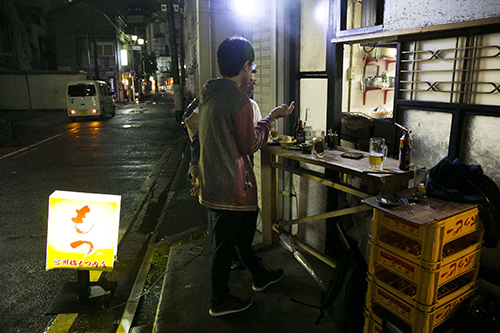
Fujiwara: But educating young people is easy to say, but in reality it's very difficult. You also teach at school, Yamauchi-san, but what do you think about that?
Yamauchi: First of all, in my role as an actor, I don't often form master-disciple relationships and teach.
The older you get, the more the power relationships that lead to harassment, such as age, career, and gender differences, accumulate. In that situation, actors have to eliminate them as much as possible.
Fujiwara: Ah, that's a really great story...
Yamauchi: I think actors who do a good job have the ability to be at eye level with the actor when they meet for the first time.
In this competitive society, if there are 100 students, 20 of them will remain in their 20s, 10 in their 30s, and 5 in their 40s. Then what will happen to the remaining 95? That's what we're always conscious of at school. So, you can hate me, but I don't want you to hate theater. I have a mission to tell you that theater is bigger than that.
When Oriza Hirata was teaching theater at J. F. Oberlin University, he said that the liberal arts approach was a good one, and I think that was right...
Fujiwara: I'd like to hear more about that.
Yamauchi: I also teach at the Film School, which is a place where the aim is for actors to become, how should I put it, overwhelmingly good, so I have to improve my students through training. So I end up putting pressure on them. In other words, if I put pressure on them, I won't be able to hang out with them. Because it's awful, like when your co-star thoroughly criticizes your acting. But right now, I have things I want to do even if I have to accept that kind of power relationship...
Fujiwara: I see. After hearing your story, I feel like something that's been bothering me lately has become a little clearer. I've had that same dilemma. I really want to have more fun, but power dynamics seem to arise...
Yamauchi: That's why it's better to call it liberal arts.
Fujiwara: By the way, what does the liberal arts that J. F. Oberlin University advocates mean?
Yamauchi: Something that enriches your life. I think the closest thing to it is respect for scholarship and predecessors. In other words, theater is amazing. Not blind faith, but respect.
Fujiwara: I see, richness that comes from respect.
Yamauchi: As actors, in order for both sides to perform at their best, the party with the stronger power relationship must at least be aware of it. I think that the moment we exert power on set, we move away from a real, human-to-human interaction.
Fujiwara: I understand that very well. I feel like I finally heard the secret I wanted to hear the most.
Yamauchi: But even if I'm just playing around, they usually treat me like a senior. That's just how it is (laughs).
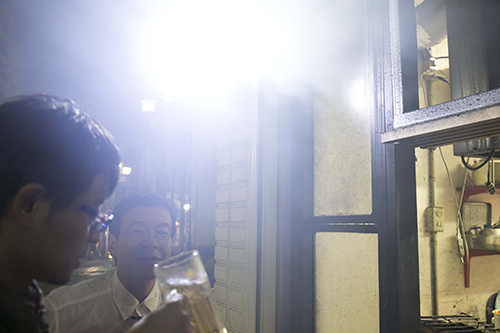
Mr. Yamauchi and Yokohama - Why are things and people concentrated in Yokohama?
Fujiwara: Shiba Yukio and his team have been running a project called "Theater Zounohana" at Zounohana Terrace for the past few years, and with the concept of "passing by theater," they have gone outside the theater. Yamauchi-san is also a member of this project, and has created "Just Listen! A 3-Minute Trip." Well, in reality, it's not 3 minutes long at all... (laughs)
*For more information about "Theater Zou no Hana," please also refer to this article from SYNODOS!
Beyond "missing theater" -- Theater Company Mamagoto "Theater Zounohana"
Yamauchi: Yeah, 10 minutes (laughs)
Fujiwara: In recent years, I have been creating projects that go outside with Engeki Quest , and from that perspective, I think Yokohama is an interesting place.
Yamauchi: What do you think is interesting about Yokohama?
Fujiwara: I'd like to ask that question in return (laughs).
Yamauchi: For me it's the topography.
Fujiwara: What do you mean?
Yamauchi: Delta.
Fujiwara: So it's Yoshida Shinden?
*Yoshida Shinden: New rice fields reclaimed in the area currently covering Naka-ku and Minami-ku in Yokohama. This area is a valley-like topography sandwiched between Nogeyama to the north and the alluvial plateau of Yamate to the south. Villages such as Yokohama-mura and Noge-mura were formed at the mouth of an inlet that had become a drowned valley due to the rise in sea levels during the Jomon period, but in the Edo period, Yoshida Kanbei obtained permission from the shogunate to reclaim new rice fields in search of larger farmland.
Yamauchi: Yes.
Yokohama is a city that has undergone many changes, from being the front door of Japan to being taken over by the US military, but I've always wondered why people gather here and grow old here. But I think the psychological effect of this space, surrounded by the mountains of Noge and Yamate, with this side closed off at an angle and this side open to the world, must be huge...
But I wonder why things and people are gathering in Yokohama like this. There's no place like that in Tokyo.
Fujiwara: I wonder why.
Yamauchi: I tend to think in terms of theater, so I'm always drawn to three things: place, people, and theater, so I tend to wander off to places that make me think about those things.
Fujiwara: For example, if we were to talk about "people" right now, who specifically are you interested in?
Yamauchi: Well, "people" means being able to really feel what kind of people are gathered in the same place. So, I've done a lot of research on Yokohama in relation to "Theater Zounohana" at Zounohana Terrace, but in the end, Yokohama was destroyed in the Great Yokohama Air Raid and the Great Kanto Earthquake, so you can't go back to the past. In a way, it feels disconnected. One of Yokohama's characteristics is that it has a history, but is disconnected.
Fujiwara: It's true that it does tend to focus on the history after the port opened.
Yamauchi: Yes, there were almost no documents about Yokohama Village before the port was opened, even in the city library or the Port Opening Memorial Museum. That's why I've been looking into areas like folklore and modernology, and I've been doing street observations, but there are no traces left on the streets anymore. But if you look at the topography, you can access the past, isn't that amazing?
Fujiwara: Where does your desire to "access the past" come from?
Yamauchi: It's about the place. It might be the memories that have accumulated there, or the feelings of people from the past.
There are traces of human involvement in both objects and places, and of course there are traces of someone sanding this table. There are places where things from over 100 years ago remain in the present day, but Yokohama is an area where there are extremely few traces of human involvement from before the Edo period. I call this the problem of "place" reclamation, and in terms of theater, today's theaters are often located in reclaimed places where traces of the past have been erased. That's why it feels like you don't know where you are. We receive performance requests from such reclaimed theaters and reclaimed towns. When that happens, I can't help but think about how I can access that place.
Fujiwara: All traces will be erased...
Ah, it's delicious. What was it called again?
Yamauchi: Rib eye. It's so delicious.
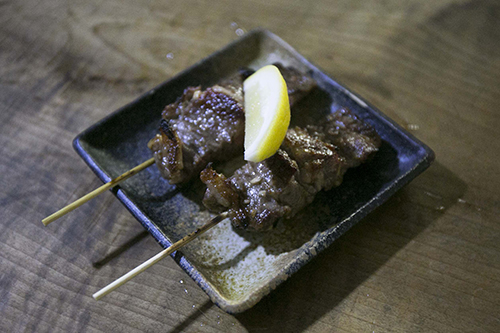
If you go late, the rib core may be sold out.
Go beyond the edge, cross the border, go on an adventure
Fujiwara: I went to Tama New Town the other day, and it really was a new town, I felt dizzy.
Yamauchi: There are no bars like this there at all.
But do you know Hashimoto Station? The atmosphere has changed completely since the Keio Line came through, but they've made the effort to build a standing bar in the middle of Keio Crown Street. I was really impressed by that.
Fujiwara: Oh.
I'm curious to see how an artist like Yamauchi, who also ventures outside the theater, views a new town like Tama Center.
Yamauchi: Hmm... It depends on the place, but housing complexes often have dark sides, like gangsters, people on welfare, people who die alone, etc. In that respect, I'm actually hopeful.
Fujiwara: The dark side of the housing complexes... I feel like Kohoku New Town still has a bit of that. It might be tough to live in a town without a dark side. The reason I moved to Yokohama was because it has a dark side.
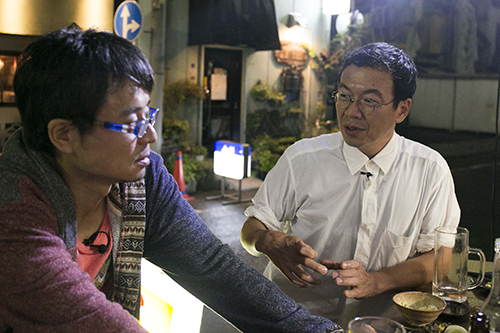
Yamauchi: If I were to make a hypothesis, Kohoku still retains its topography, but Tama New Town is an extremely leveled area. It's like it's been reclaimed to the point where the topography is no longer preserved. It may be a bit similar to how China radically excluded foreign tribes from far away, calling them Nanban or Xirong, and created an outside world, but I think Tama New Town clearly has a dark side called the "abundance."
Fujiwara: Speaking of which, the other day when I was doing a residency production for "Engeki Quest" at Kinosaki International Arts Center, I went to a place called Momojima, which is just over a mountain pass from the hot spring town of Kinosaki. It was amazing. I'm sure if Yamauchi-san went there, he'd be screaming (laughs).
There is a stone monument of the abandoned farmers' resentment, with the words "We await the criticism of future historians" written on it. But that fact has already been largely forgotten. By crossing the edge, by crossing the border, something different may come into view. I think that is what "adventure" is all about.
Yamauchi: Yes. I think the kids in Tama New Town probably ride their bikes to the edge of the pond too. And that's great.
Fujiwara: Yes, that's true. I think I want to go beyond the edge and go on an adventure.
End
Here is the store information
Here is today's menu
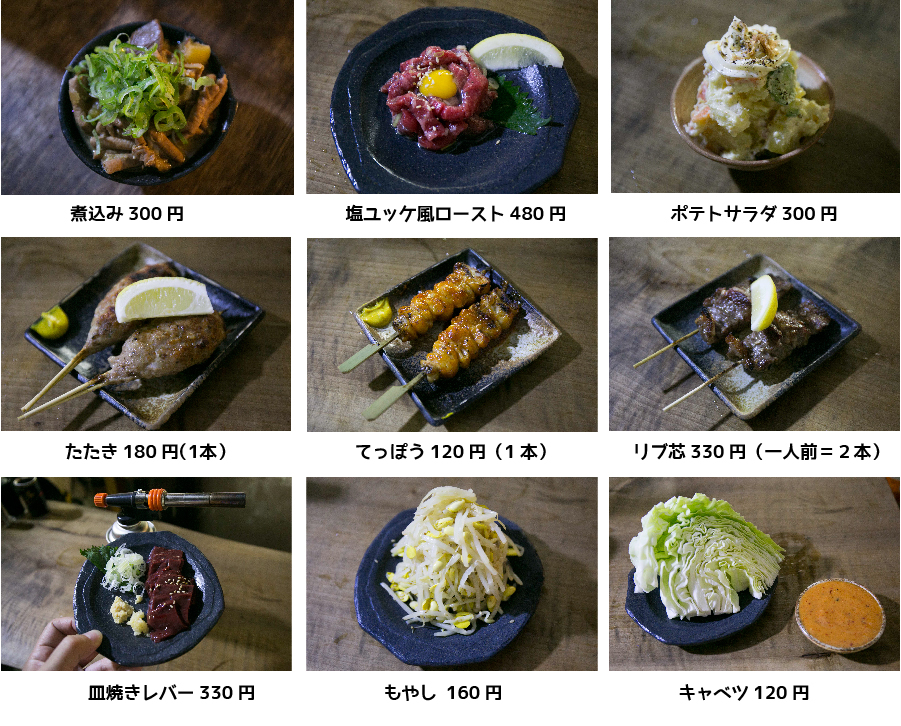
And this time, Chikara Fujiwara's recommendation is...
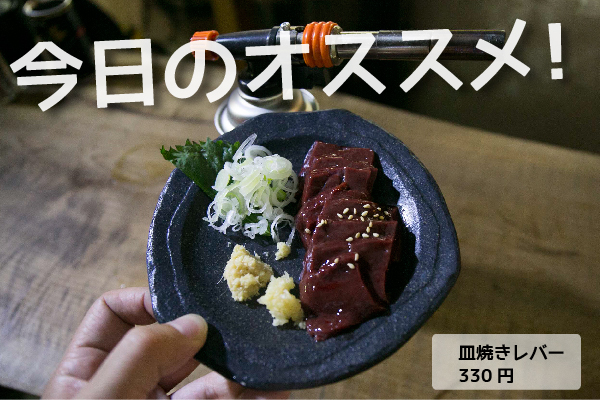
Caution: Be sure to roast it over a gas burner before eating!
Miyagawabashi Motsu Meat Shop
http://tabelog.com/kanagawa/A1401/A140102/14042505/
Kanagawa Prefecture, Yokohama City, Naka Ward, Miyagawa-cho 1-4
TEL: Not disclosed
Closed: Tuesdays and Mondays that fall on public holidays
Business hours: [Weekdays] After 16:00 to 23:00 [Fridays and Saturdays] After 16:00 to 24:00 [Sundays and holidays] After 16:00 to 22:30
*Please note that the restaurant will open as soon as preparation is finished between 4:00 and 4:59 p.m.
Access: 6 minutes walk from JR Sakuragicho Station / 6 minutes walk from Keikyu Hinodecho Station / 305m from Sakuragicho Station
